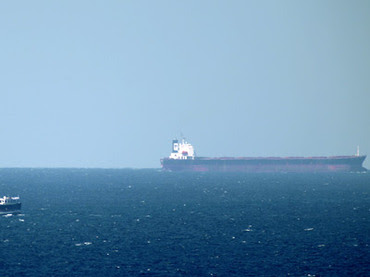Naval commander in Iran's Revolutionary Guard, says Iran can stop even 'a single drop of oil' passing through the Strait of Hormuz.
The Strait of Hormuz is a strategic shipping route through the Persian Gulf.
Photo by AP
Iran could prevent even "a single drop of oil" passing through the Strait of Hormuz if its security is threatened, a naval chief said on Saturday, as tensions simmer over Tehran's nuclear program.
Tehran will increase its military presence in international waters, said Ali Fadavi, naval commander in Iran's elite Islamic Revolutionary Guard Corps (IRGC).
"If they (the U.S.) do not obey international laws and the IRGC's warnings, it will have very bad consequences for them," Fadavi said, according to Iran's Fars News Agency.
"The IRGC's naval forces have had the ability since the (Iran-Iraq) war to completely control the Strait of Hormuz and not allow even a single drop of oil to pass through."
Fadavi added: "IRGC special naval forces are present on all of the Islamic Republic of Iran's ships in the Indian Ocean and to its east and west, to prevent any movement.
"This IRGC naval force presence in international waters will increase."
Iran's Oil Minister Rostam Qasemi said his office has drawn up plans to make newly tightened sanctions against the Islamic Republic ineffective.
His remarks, carried by ministry website shana.ir on Saturday, did not elaborate on the plans. Qasemi's comments come two weeks after an EU oil embargo went into effect against Iran for its refusal to halt its uranium enrichment program.
Iran has repeatedly threatened to close the Strait of Hormuz shipping channel, through which 40 percent of the world's sea-borne oil exports passes, in retaliation for sanctions placed on its crude exports by Western powers.
The sanctions were imposed over Iran's nuclear program, which the West suspects is aimed at creating an atomic weapon. Iran says the program is for peaceful energy purposes.
The United States has beefed up its presence in the Gulf, adding a navy ship last week to help mine-clearing operations if Iran were to act on threats to block the strait. Tehran said last month it was building more warships, in part to guard Iranian cargo ships from pirates, and Iranian military leaders often assert Iran's strength in the region and dominance in the Strait of Hormuz.
Military analysts have cast doubt on Iran's willingness to block the slender waterway, given the massive U.S.-led retaliation it would likely incur.

